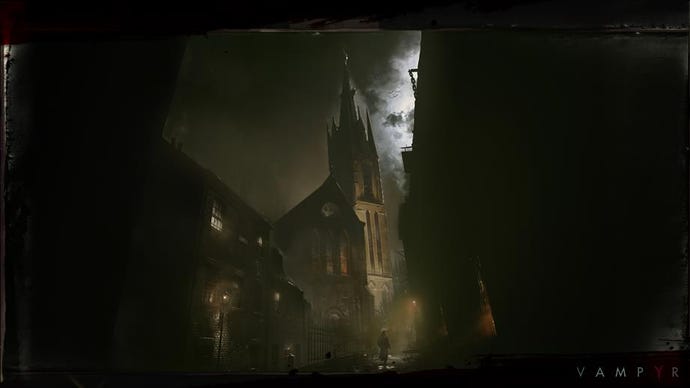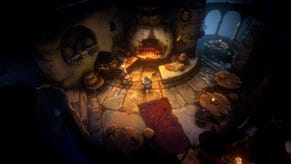Dontnod's new game Vampyr is nothing like Life Is Strange
One vampire has the ability to influence the entire city of London. But can Jonathan Reid follow the success of Maxine Caulfield?
"Vampyr is, without question, the most technically challenging undertaking this young company (has even undertaken and, as a result, represents the greatest risk it has ever opted to embrace."
Given the reputation garnered by the critical and commercial success of Life is Strange, Paris-based studio Dontnod now finds itself in a situation both desirable and difficult. On the one hand, anything it turns its hands to is destined to be taken notice of and given serious consideration. On the other, all future releases must hit a standard far higher than was previously expected of it. Anything less would be much to harm the reputation it has built.
How does Dontnod go about delivering that standard in a bid to make sure that the extra consideration is justified and remains in place in future? The answer, it seems, is to go bigger than it has ever gone before. Vampyr is, without question, the most technically challenging undertaking this young company (founded 2008) has even undertaken and, as a result, represents the greatest risk it has ever opted to embrace. Nothing ventured, nothing gained.
The stage is London, 1918, a disease is ripping through a city struggling to cover its own maintenance costs following the end of World War I. The lead is Jonathan Reid, a war veteran recently and forcibly converted to vampirism. As far as the overarching narrative is concerned, it's Reid's mind that takes centre stage as he struggles to remain the honourable man he saw himself as prior to his transformation while having to somehow satisfy his new need to consume blood.
How he engages and reacts to this challenge is down to you. It should come as no surprise given Dontnod's past form that dialogue decisions are, going by the 30 minutes(ish) of Vampyr we've seen thus far, commonplace. Interacting with London's inhabitants works to uncover more about the individuals in question, but also about the state of the city in general and the goings on around the local neighbourhoods. This is information that can be used to, if you so desire, identify the kinds of human food sources that are least likely to be missed... and where they're likely to be found.
Once identified, you're under no obligation to kill. Taking blood works to increase your character level, which in turn allows you to learn new combat abilities and mind/dialogue manipulation traits, but you're apparently able to finish the entire thing without taking a life.
At you've no doubt gleaned from the mention of 'character level' and 'combat abilities', and despite the heavy investment in an interactive narrative, Vampyr is not of the Life is Strange school of core design. Combat, as well as open-world exploration, play a major role here and make your experience with Reid one that is very much 'third-person action RPG' in nature.
"While there is potential here should the final ability list include ideas we've not seen before, there's no getting away from the fact that the underlying core mechanics of combat seem to lack any originality or impact."
Admittedly, I've seen only a brief snippet of what is clearly a game of considerable scale, but at present it's the combat that comes across as the least interesting and most conventional - and therefore predictable - of Vampyr's constituent parts. Hacking and slashing through simple combos is the order of the day, the goal being to dispatch of the weaker vampires roaming London. Vampire hunters also make an appearance in an effort to take you out, I'm told, but such encounters were not shown this time around.
Learned moves such as 'Spring', which sees you able to hop up to platforms otherwise out of reach, or dash forward at lightning pace to quickly close gaps, are designed to embed combat with a degree of personalisation and variety. As nice as that sounds, and while there is potential here should the final ability list include ideas we've not seen before, there's no getting away from the fact that the underlying core mechanics of combat seem to lack any originality or impact.
Given the 2017 release date, plenty of time remains for Dontnod to work on this aspect and get it right and, due to the lofty potential of the narrative elements, I hold genuine hope that the combat is improved down the line. Third-person combat is hardly a rarity across the modern videogame landscape and so any new addition to this reality must present something truly impressive in order to be valued.
Mystery still surrounds the workings of much of the world itself. The environment is what Dontnod describes as 'semi open-world', with large areas connected by smaller zones. How this works in reality, and what the implications to gameplay and narrative progression are, is unknown at this point, however.
What is known is that your actions within an area has a major affect on the people within it and the overall state of the neighbourhood. Should you decide to kill wildly in one place then the residents there will become more afraid and, in turn, that results in a more violent and less understanding way of life. Conversely, choosing not to kill makes the inhabitants feel safer and less likely to act unpredictably out of fear and suspicion.
Ultimately, the state of London as a whole is influenced by how you act. By the end of the game the entire metropolis might have been brought to its knees and be ready to self-destruct, or it might find itself be in a position to abandon the pain and set itself on a new path to peace and tranquillity. At least, that is, until World War II arrives...
It's these possible outcomes and how they're arrived at, alongside the turmoil within Reid, that make up Vampyr's most interesting segments. In a very real way it's tempting to declare that the whole proposition would be improved by removing the combat together, but to do so would be grossly unfair given how much development time is left to run.
Dontnod's deserves to be given the benefit of the doubt due the excellent work it has produced in the recent past and, whatever the case, any game looking to achieve so much is more than worth keeping track of.
Vampyre is due for release in 2017, to be published by Focus Home Interactive.















.png?width=291&height=164&fit=crop&quality=80&format=jpg&auto=webp)






